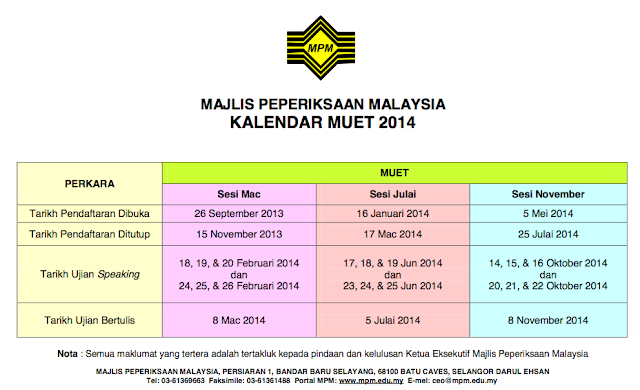(err not really...) | Arimi - Blog <b>Muet</b> - Blogger - Blog Muet |
| (err not really...) | Arimi - Blog <b>Muet</b> - Blogger Posted: 11 Apr 2014 07:45 PM PDT Malaysian University English Test (MUET) Yes, I have sat for the exam and scored band 3. Do you think I am qualified to give out some tips? Well, actually I'm not going to share the tricks for answering MUET papers, but more on sharing my past experience when sitting for MUET. I think this post is very suitable to be read by UIA students especially. If you feel like reading this post is wasting your time and this post isn't helpful, then you are free to leave. Hehe. For UIA students, err, I'm telling you that MUET isn't that useful in UIA. Although if you scored band 6 either, once you enrolled to UIA, you will need to sit for special English test named English Placement Test (EPT). No automatic exemption for you. For CFS students, you have nothing to worry about if you have been exempted from the test. For other public + private institutions, MUET is a MUST for you. I took my MUET exam last year, final year session, at UIA PJ. Speaking My speaking assessment was held earlier than writing and the rest. During speaking test, I was given a topic on how to curb disciplinary problems in school. When presenting my point of view, I was stammering throughout the section A and freely the examiners deducted my marks. So sad. For speaking test, it consists of two tasks. A and B. (or 1 and 2? forgot already).
Writing For writing, you will need to write two essays.
I have no idea about the correct techniques that must be used. Go and find some other resources to know about writing format. It is good if you read a lot. By reading, you can enrich your general knowledge. This may be useful to relate your essay with additional quotes and facts that you know. Do more practice on grammar also. Grammar is the backbone of English. Reading Reading part, the part that will make you drowsy. I advise you to bring some drinking water into the examination hall so that you won't have your beauty sleep during the exam. How to answer reading questions? Simple! You need more exercises. The more exercises you do, the easier for you to tackle the question. Bring some highlighters, and highlight for any hints that you found. My skill on answering reading paper: I didn't read the whole text, but simply jumped into the questions straight away to avoid reading those that-so-called bed time story, and looked for the answers on the text by using skimming and scanning skill (very important reading skill). Google it! Listening The only things that you need are a pencil/pen and an eraser. If possible, you may dig your ear and clean the earwax that blocks/limits your hearing capability because you need your ear and brain to work together. During the exam, make sure you focus 100% on the radio and let your brain think faster. The radio will read out any conversations, advertisements, podcast, etc. The information that you need to fill up may differ but same meaning, so you need to think very fast. If you missed, don't panic! Just go ahead. The radio will read out twice, so no worry. Use your common sense for the missing parts, don't leave them empty! ********************************************************************************* These tips perhaps aren't that good and helpful as what you expected them to be, because I'm not a teacher/lecturer/examiner who teaches and marks MUET papers. I'm sharing this based on my previous experience when I was taking MUET. I didn't really put my interest during the exam because it is not really important for UIA students. For us, as long as you have sat for the exam, then you're free to get through your study in UIA. No required bands for us, except for some critical courses: Medical, Dentistry, Pharmacy (minimum band 3). For better tips, just google for International English test (IELTS/TOEFL) to see some useful tricks that could be used in MUET. Good luck anyway! :D p/s: very bad writing, I know... |
| You are subscribed to email updates from muet past year paper - Google Blog Search To stop receiving these emails, you may unsubscribe now. | Email delivery powered by Google |
| Google Inc., 20 West Kinzie, Chicago IL USA 60610 | |






+2014.png)


